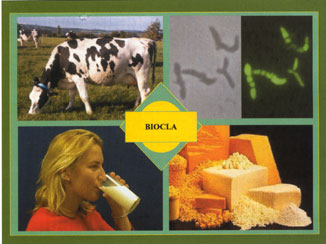| 2003 |

|
YEAR BOOK |
Teagasc - Dairy Products Research Centre, Moorepark, Fermoy, Co. Cork(1), Dublin City University(2), University College Cork(3)
|
Development of functional foods enriched in the health promoting fatty acid Conjugated Linoleic Acid
|

A number of studies have reported on various nutritional regimes and dietary supplements suitable for the elevation of bovine milkfat CLA, which can be elevated through manipulation of the animal diet, and cows on pasture produce higher CLA in their milk than cows housed indoors. Dietary oils rich in C18 polyunsaturated fatty acids (PUFA), such as plant oils rich in linoleic acid, have been shown to positively influence the content of CLA in bovine milkfat. Our studies are aimed at development of dairy based functional foods through animal dietary strategies for increasing the CLA content of bovine milk fat. Our aim is to enrich the CLA content of dairy foods, through animal nutritional supplementation of dairy cows on pasture with plant oils rich in polyunsaturated fatty acids, with a view to producing functional foods enriched in CLA for human consumption.
In addition to CLA production in milk, our studies have found that some strains of bifidobacteria of human intestinal origin can make CLA from linoleic acid at a high efficiency. There is considerable evidence that Bifidobacterium play a major therapeutic and health promoting role in the gastro intestinal tract, including tumour inhibitory effects and activation/regulation of the immune system. Indeed, the ability of bifidobacteria to make the anticarcinogenic fatty acid CLA offers a possible mechanism for some health enhancing properties of bifidobacteria and provides novel opportunities for the development of functional foods.
The CLA research programme at Teagasc, Moorepark, in collaboration with UCC and DCU is funded by the Irish Government under the National Development Plan 2000-2006 and Science Foundation Ireland Funds. In addition, Teagasc Moorepark is leading a new conjugated linoleic acid research programme - BIOCLA (under the EU's 5th Framework Programme) with eight other EU partners. This project, which started in January 2003, has the aim of developing functional dairy foods, through animal dietary strategies for increasing the CLA content of bovine, ovine (sheep) and caprine (goat) milk and through exploitation of food-grade cultures for CLA-biosynthesis. The CLA-enriched dairy foods produced in this project will be tested in human clinical trials.

|

|
Contact: Dr. Catherine Stanton; Tel: 025 42442; E-mail: [email protected]